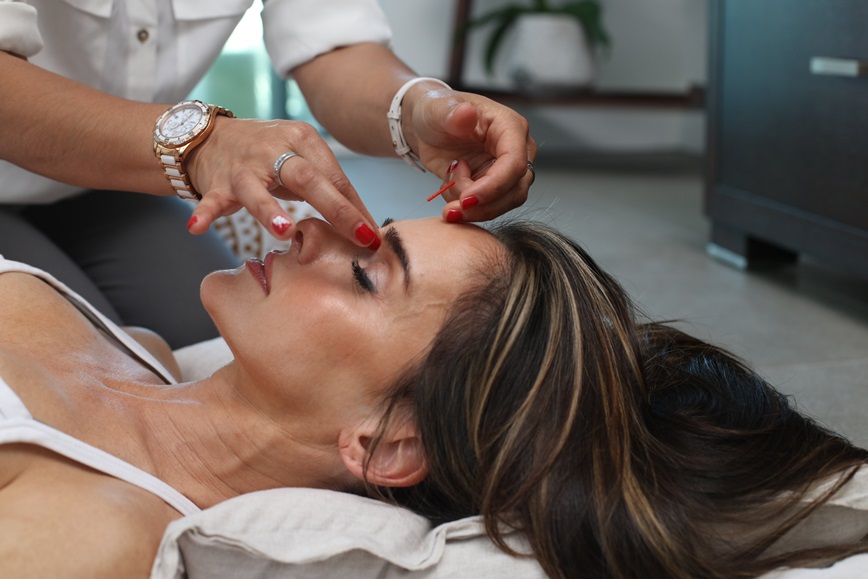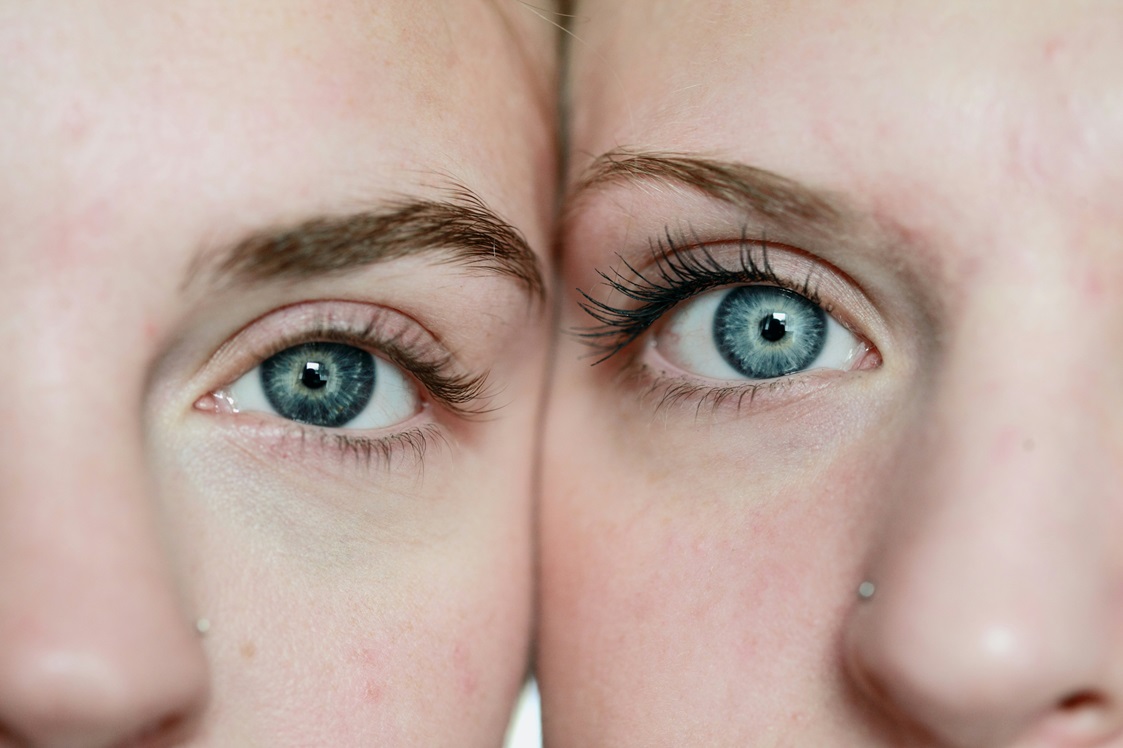Facial acupuncture is an alternative skincare approach gaining attention for its potential benefits in promoting skin health. Based on traditional Chinese medicine, it differs from conventional skincare methods by targeting specific acupoints on the face to address aesthetic concerns.
As interest in natural beauty treatments grows, facial acupuncture is positioned as a blend of ancient techniques and modern desires for healthier skin. This exploration examines the foundational principles of facial acupuncture, going through the benefits and potential side effects.
What is Facial Acupuncture?

Facial acupuncture—deeply rooted in traditional Chinese medicine,—operates on the belief that the face reflects the body’s internal balance and health. With origins dating back thousands of years, acupuncture is a staple in Chinese medicine, seeking to balance the body’s vital energy by stimulating points along meridians. As a specialized branch, it focuses on face and neck acupoints.
In contrast to traditional acupuncture —which addresses overall health concerns by targeting the body’s energy flow,—facial acupuncture aims for aesthetic benefits like improved skin tone and reduced wrinkles. This approach involves inserting fine needles into specific facial points to enhance blood circulation, stimulate collagen production, and restore the body’s natural energy balance. By adapting traditional Chinese medicine principles to the pursuit of beauty, facial acupuncture provides a distinct and holistic pathway to vibrant and healthy skin.
How does it work?
Facial acupuncture operates on a scientific basis that aligns with the principles of traditional Chinese medicine. The insertion of fine needles into specific acupoints on the face and neck stimulates nerve endings and triggers a localized micro-trauma. This micro-trauma prompts the body’s natural healing response, promoting increased blood circulation to the targeted areas. Enhanced blood flow brings vital nutrients and oxygen to the skin, supporting cell regeneration and collagen production.
Additionally, the needling process is believed to activate the release of endorphins, promoting a sense of relaxation and well-being. The strategic placement of needles also aims to balance the body’s energy flow, known as Qi, which is thought to play a role in overall health and skin vitality.
While the scientific understanding of facial acupuncture is ongoing, proponents assert that combining these factors contributes to improved skin tone, reduced wrinkles, and a revitalized complexion. When performed by trained practitioners, the technique is considered safe and minimally invasive, providing an intriguing intersection between traditional wisdom and contemporary skincare practices.
How to prepare for a Facial Acupuncture Session?
Preparing for a facial acupuncture session involves a few practical steps to ensure a comfortable and beneficial experience. Firstly, it’s advisable to arrive well-hydrated and with a clean face, free of makeup or skincare products. Avoiding caffeine and heavy meals before the session can also contribute to a more relaxed state.
Wear loose and comfortable clothing, as the acupuncturist may need access to areas beyond the face. Communicating any pre-existing skin conditions, allergies, or health concerns with the practitioner is essential to tailor the session accordingly.
During the session, individuals can expect the acupuncturist to carefully insert thin needles into specific facial and neck acupoints. While the process is generally painless, some may experience mild sensations such as tingling or warmth.
After the session, it’s recommended to avoid intense sunlight, harsh skincare products, and strenuous activities for a brief period. Maintaining good hydration and getting ample rest post-session can further support the body’s recovery. Lastly, being mentally and physically prepared ensures a positive and effective facial acupuncture experience.
What are the Benefits of Facial Acupuncture?

Facial acupuncture offers many benefits, from enhanced collagen production and improved skin texture to acne reduction and soothing effects on inflammation and jaw tension. Below, we discuss each of these benefits in more detail.
Improved collagen production
Facial acupuncture is renowned for its potential to enhance skin firmness by stimulating collagen production. The controlled microtrauma triggered by the needles prompts the body’s natural healing response, increasing blood circulation and releasing growth factors. The heightened circulation delivers essential nutrients and oxygen to the skin cells, while the micro-trauma stimulates fibroblasts—the cells responsible for collagen and elastin production.
As collagen levels rise, the skin gains improved elasticity and firmness. This natural boost in collagen contributes to the reduction of fine lines and wrinkles and promotes a more resilient and youthful appearance over time. The controlled nature of this collagen induction through facial acupuncture provides a gentle yet effective means of supporting skin health and vitality.
Reduced acne
Facial acupuncture has also shown promise in addressing acne issues. Targeting specific facial acupoints aims to rebalance the body’s internal energy and address underlying factors contributing to acne development. The insertion of fine needles into these points stimulates blood circulation and promotes the body’s natural healing mechanisms, assisting in detoxification. Improved blood flow enhances nutrient delivery to the skin, aiding in cell regeneration and reducing inflammation associated with acne.
Additionally, facial acupuncture may help regulate hormonal imbalances that often contribute to acne outbreaks. The overall effect is a potential reduction in the frequency and severity of acne, offering an alternative and integrative approach to promoting clearer and healthier skin.
Reduced inflammation and jaw tension
Another benefit of facial acupuncture is the soothing effects on inflammation and jaw tension, providing relief in a natural and non-invasive manner. Facial acupuncture needles stimulate increased blood circulation and release anti-inflammatory agents. This targeted approach helps to mitigate inflammation, contributing to a calmer and more even skin tone.
Moreover, facial acupuncture can address jaw tension by targeting acupoints related to facial muscles and stress relief. The release of tension in these areas promotes a sense of relaxation and may also alleviate symptoms associated with temporomandibular joint (TMJ) disorders.
Improved skin texture
Facial acupuncture has also been lauded for its positive effects on skin texture and radiance. This practice stimulates blood circulation, fostering enhanced nutrient and oxygen delivery to the skin cells. The heightened circulation contributes to a more balanced and revitalized complexion, smoothing uneven textures and promoting a natural radiance.
The micro-trauma induced by the acupuncture needles also encourages collagen production, leading to improved skin elasticity and a finer texture. As a result, individuals may experience a reduction in the appearance of fine lines and wrinkles, contributing to a noticeably smoother and more youthful skin texture. The holistic benefits of facial acupuncture extend beyond mere aesthetics, emphasizing its potential to rejuvenate and invigorate the skin for a healthier overall complexion.
How Much Does it Cost?
The cost of facial acupuncture varies, with out-of-pocket expenses for a single session potentially reaching up to $150. Achieving noticeable results may require as many as 12 treatment sessions. It’s worth noting that factors such as location and practitioner experience can influence the overall cost.
Health insurance coverage may extend to cosmetic acupuncture if performed by a registered traditional Chinese medicine (TCM) practitioner; however, individual policies vary. Any recommended traditional Chinese herbs, tonics, or skincare products may incur additional expenses. Individuals considering facial acupuncture should inquire about specific pricing structures and potential insurance coverage with their chosen practitioner to comprehensively understand the associated costs.
Potential Side Effects of Facial Acupuncture
While facial acupuncture is generally considered safe, individuals should be aware of potential side effects and considerations associated with the practice. Consulting with a qualified practitioner is crucial to ensure a personalized and safe experience. Facial acupuncture side effects may include:
1. Temporary Bruising: Minor bruising at the needle insertion points is possible but typically fades quickly.
2. Slight Discomfort: Individuals may experience mild discomfort or a tingling sensation during needle insertion, but it is usually brief.
3. Skin Redness: Temporary redness or irritation at the needling sites is normal and typically resolves shortly after the session.
4. Rare Infections: Although rare, improper sterilization of needles could lead to infections. Choosing a reputable practitioner who follows proper hygiene practices minimizes this risk.
By prioritizing a consultation with a qualified professional, you can address any concerns and ensure a safe and tailored facial acupuncture experience.
Bottom line
In summary, facial acupuncture offers a holistic approach to skincare, targeting specific facial acupoints to potentially improve skin texture, reduce inflammation, and enhance collagen production. While showing promise in promoting skin health, individuals should be aware of potential side effects and choose a qualified practitioner.
Personal experiences may vary, emphasizing the importance of a balanced perspective and consultation with a trusted practitioner when considering integrating facial acupuncture into a wellness routine.
Frequently Asked Questions:
Does facial acupuncture really work?
Facial acupuncture is believed to work by stimulating blood circulation, promoting collagen production, and balancing energy flow, contributing to improved skin health. Individual results may vary.
How often should I do facial acupuncture?
The frequency of facial acupuncture sessions varies, but a standard recommendation is once a week for an initial series, followed by maintenance sessions every 4-6 weeks.
How long does it take to see results from facial acupuncture?
Results from facial acupuncture may vary, but some individuals report noticing improvements in skin texture and radiance after a few sessions. Long-term benefits often become more apparent with continued treatment.
Why is facial acupuncture better than Botox?
Facial acupuncture is considered a natural alternative to Botox, offering a non-invasive approach to addressing skincare concerns. It stimulates the body’s natural healing mechanisms, promoting a more gradual and subtle improvement in skin tone and texture.
How long does facial acupuncture last?
The effects of facial acupuncture are cumulative, and maintenance sessions are typically recommended every few weeks or months to sustain the results. The duration of results varies among individuals.